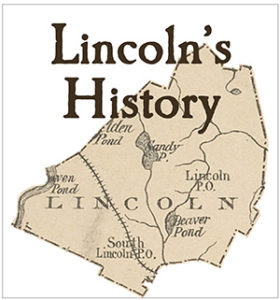By the Lincoln250 Planning Committee
 In May 1773, the British Parliament passed the widely unpopular Tea Act, and in December that same year, nearly 100 patriots dumped an entire shipment of East India Company tea into the Boston Harbor.
In May 1773, the British Parliament passed the widely unpopular Tea Act, and in December that same year, nearly 100 patriots dumped an entire shipment of East India Company tea into the Boston Harbor.
Four days after the Destruction of the Tea and again a week later, Lincoln’s Town Meeting took up a request from Boston leaders for the town’s support. The town’s own Committee of Correspondence drafted a reply, and Town Meeting members deliberated over the draft text. They were cautious about endorsing the destruction of private property, but they nevertheless approved a stirring response: “We cannot therefor but Commend the Spirited behaviour of the town of Boston in Endeavouring to prevent the sale of the East India Company’s teas by Endeavouring to perswade the Consigners to Resign their office or any other Lawfull means.” In addition, Lincoln residents resolved neither to purchase nor use tea so long as there was a duty on it, and to “hold and esteem such as Do use such tea Enemies to their Country.” 1
On December 16, 2023, Boston will celebrate the 250th anniversary of the Destruction of the Tea (the “Boston Tea Party” phrase was coined in the 1830s). On this day at Griffin’s Wharf in Boston, 46 tons of tea (valued at £9,659 — roughly $2 million today) was dumped over the sides of three British ships. Britain retaliated by passing the Coercive Acts, which were meant to end the rebellion in New England, but the opposite happened. Within months the “shot heard around the world” rang out in Concord. This marked the beginning of the American Revolution.
To learn more about the history of the Boston Tea Party or see upcoming events to celebrate the 250th, please click on the links below:
Thank you to the Lincoln Library for recently hosting two events to commemorate the 250th anniversary of the Boston Tea Party! To learn more about Lincoln250 or watch for upcoming events in or around Lincoln to celebrate the 250th anniversary of the historic battles of Lexington and Concord, see the Lincoln250 website.
1 MacLean, John C. (1987). A Rich Harvest: The History, Buildings, and People of Lincoln, Massachusetts (Lincoln Historical Society).
It’s a popular misconception that the Tea Act raised taxes. It actually lowered the import duty on British tea, making it cheaper and more competitive. (Of the tea consumed in the American colonies at the time, 75% was smuggled in from places like Holland by merchants including John Hancock.)
I feel compelled to add that the revolution’s first shot was fired in Lexington, not Concord. Although “the shot heard round the world” does refer to the battle at Concord, as memorialized by Emerson some 60 years later.